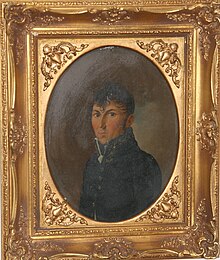Karl Leopold Fabian
Karl Leopold Fabian (born November 12, 1782 in Schönebeck ; † March 14, 1855 there ) was a German secret mountain ridge and upper mountain ridge .
Life
Karl Leopold Fabian began his apprenticeship on August 18, 1801 during the French period as a so-called student at the Schönebeck graduation house . On July 17, 1809, under French suzerainty, he was appointed Sous-Ingénieur des mines ( power of procuration authorized mining engineer ). He then took over as Siedeinspektor in Rodenberg in Weserbergland operates. In 1812 he was transferred to the Magdeburg-Halberstädtischen Oberbergamt in Rothenburg an der Saale as verificateur (mining inspector) .
After the withdrawal of the French troops from Prussia , he was appointed director of the Salzamt zu Schönebeck in 1815 . In addition, from 1818 he worked as a salt works inspector for all salt works in the area of application of the Magdeburg-Halberstädtischer Oberbergamt. Under his leadership, the saltworks in Salzelmen developed into the largest and most important salt mine in Prussia. In 1822 Fabian became Oberbergrat and received his distinction as Bergrat and in 1837 the Order of the Red Eagle .
In the Magdeburg region , particularly in the area of beers and Eggersdorf , he drove for the fuel use in salt mines significantly the disruption of commercial lignite mines ahead. Towards the end of the 1840s, Fabian invented the freefall piece named after him ( Fabian's free fall piece ) for deep drilling . King Wilhelm I awarded him the title of Secret Mountain Ridge in 1851 after he had previously been appointed "Real Member of the Royal Higher Mining Office".
Karl Leopold Fabian is considered to be the progenitor of the Fabian family, to which important Prussian mining officials belonged in the following years . These included his son Konstantin Fabian (* 1803, † 1864), Royal Prussian Salt Office Assessor at the Saline in Halle, and his nephew Otto Fabian (* 1856, † 1938), long-time honorary president of the Chamber of Industry and Commerce in Halle and Founder of the first Central German Brown Hollow Syndicate .
Awards and titles
- Mountain ridge (1837)
- Secret mountain ridge (1851)
- Order of the Red Eagle (4th grade)
literature
- Ekkehart Fabian: Fabian, Karl Leopold. In: New German Biography (NDB). Volume 4, Duncker & Humblot, Berlin 1959, ISBN 3-428-00185-0 , p. 726 ( digitized version ).
Individual evidence
- ↑ Beeckmann, E. Jüngst: Glückauf. Berg- und Hüttenmännische magazine. Volume 63, no.14 . Glückauf Verlag, 1927, p. 492. Delibra, accessed on October 26, 2019.
- ↑ Beeckmann, E. Jüngst: Glückauf. Berg- und Hüttenmännische magazine. Volume 63, no.14 . Glückauf Verlag, 1927, p. 492. Delibra, accessed on October 26, 2019.
| personal data | |
|---|---|
| SURNAME | Fabian, Karl Leopold |
| BRIEF DESCRIPTION | Secret mountain ridge, upper mountain ridge and salt office director of Bad Salzelmen |
| DATE OF BIRTH | November 12, 1782 |
| PLACE OF BIRTH | Schönebeck (Elbe) |
| DATE OF DEATH | March 14, 1855 |
| Place of death | Schönebeck |
